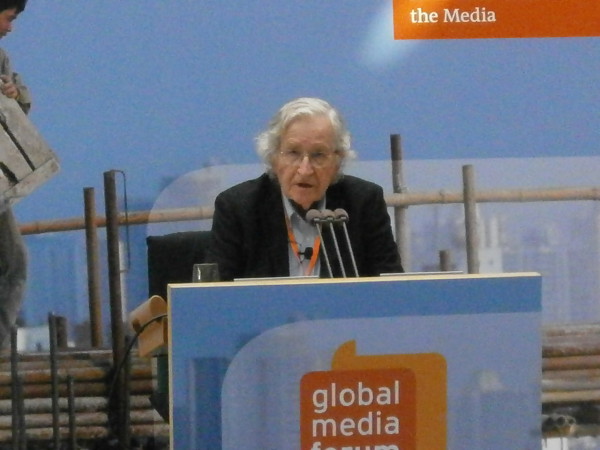In his fascinating and lucid 1h 20min speech to an audience of 2,500 people in the plenary hall on the first day of the Deutsche Welle Global Media Forum, Chomsky touched on many subjects, among them: the alternative model of the ‘Commons’, false democracy and the issue of weapons in their various forms (drones, the nuclear threat, Obama’s terrorist policies).
We asked the presenters of the Pressenza panel and its Director for their views on these issues.
– With respect to the way in which Chomsky discussed the issue of the Commons alternative model, what are your thoughts?
David Andersson: I liked that Chomsky touched on this issue by introducing a view of the historical process and not only of the present. This is a central theme, very broad and diverse because it involves what is neither public nor private, for example, certain services: Wikimedia commons, Linux, community activities, networks of reciprocity, common goods such as water or the air, common spaces that are neither public nor private.
This concept worries the system because it cannot be controlled and limits or rules cannot be placed on it, and although the commons do have rules, these are dynamic, such as the case of Internet, when it is not controlled.
The process of appropriation of goods and services generally begins from the commons, then it becomes public and ends up private.
What is happening with health or education in many countries is a clear example of this mechanism: the first step is to transform a ‘common good’ into a public good, which is then handled by politicians who make sure it is badly organised to then privatise it, which is presented as the ideal solution.
And the commons are the opposite of this trend.
What is happening right now in Turkey is an example of what happens when an attempt is made to appropriate something that people feel deeply as a ‘common’ good.
– Chomsky’s main issue in his speech was false democracy. What was for you the most striking point?
Roberto Blueh: I found most interesting the way Chomsky introduced the subject with examples showing the historical process through which the minority that controls most wealth and power has pretended to protect the weak whilst actually only defending their own interests, leading up to what today they call democracy.
Today it is quite evident that governments do something very different from what the people want, as you can see in the cases of Spain, Greece, Turkey, …
– As Spokesperson for ‘World without Wars and Violence’ what do you think about Chomsky’s analysis emphasising the weapons issue in its various forms (drones, the nuclear danger, Obama’s terrorist policies).
Tony Robinson: His view coincides with ours, Chomsky is clear that the problem comes from the U.S. government rather than from those of Iran, China or Korea.
It is not just the fact of having weapons and military technology but mainly the basic attitude of giving themselves the right to do anything to protect their interests but not allowing others the right to any possible self-defence.
As an example, the operation such as the killing of Bin Laden in Pakistan shows the irresponsibility of the Obama administration, aware of the risk of unleashing a war with a country that has nuclear weapons.
We also believe that the greatest threat today is the nuclear danger.
– At the end, the forum presenter who had introduced Chomsky’s speech asked him what he would like the press to do? To which he answered: “To tell the truth about the things that matter.”
As director of Pressenza, how do you interpret Chomsky’s response?
Pia Figueroa: As a denunciation of Media manipulation, carried out from a central point of the press in Europe. The Media today consists of press corporations owned by large and powerful economic conglomerates. In Latin America, where I live, they represent the main opposition to the progressive governments of the region. There are no opposition parties but opposition Media which, in the midst of a situation of political de-structuring, insist on proposing an outdated and ineffective model.










